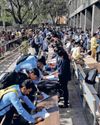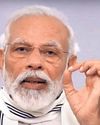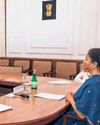
WITH ITS POOR PUBLIC health system, India ranks amongst the lowest in the world in terms of testing rates per million population for COVID-19. The lockdown from March 25, extended on April 14 up to May 3 and subsequently to May 17 with a partial opening up, gave the government time to work out a strategy and also reduced the burden on hospitalisations. While the spread of the virus may have been contained to an extent, there is little certainty on whether it has been suppressed.
Professor Srinath Reddy, who is a member of the 21-member high-level technical committee of public health experts, chaired by NITI Aayog member Dr. V.K. Paul, spoke to Frontline about the limitations of testing in the general population, the importance of random sampling, surveillance of influenzalike illness (ILI) and severe acute respiratory infection (SARI), and the impact of physical distancing on the poor. Excerpts:
The experiences of dealing with the outbreak are varied across countries, particularly with regard to the extent of lockdown measures, scale of testing, and the relative weightage given to these two. The government’s current strategy is to expand testing, which is also what the WHO recommends. Have we, however, lost precious time by not scaling up testing during the 30 days of the lockdown? Given the limitations of both an extended lockdown and of testing a 1.3 billion population, what options does India have going forward?
この記事は FRONTLINE の May 22, 2020 版に掲載されています。
7 日間の Magzter GOLD 無料トライアルを開始して、何千もの厳選されたプレミアム ストーリー、9,000 以上の雑誌や新聞にアクセスしてください。
すでに購読者です ? サインイン
この記事は FRONTLINE の May 22, 2020 版に掲載されています。
7 日間の Magzter GOLD 無料トライアルを開始して、何千もの厳選されたプレミアム ストーリー、9,000 以上の雑誌や新聞にアクセスしてください。
すでに購読者です? サインイン

Sarpanchs as game changers
Odisha manages to keep COVID-19 well under control because of the strong participation of panchayati raj institutions and the community at the grass-roots level under the leadership of Chief Minister Naveen Patnaik.

New worries
Kerala’s measured approach to the pandemic and lockdown has yielded results. But it still has to grapple with their huge economic impact on its economy, which it feels the Centre’s special financial relief package does little to alleviate.

Capital's Malthusian moment
In a world that needs substantial reorienting of production and distribution, Indian capital is resorting to a militant form of moribund neoliberalism to overcome its current crisis. In this pursuit of profit, it is ready and willing to throw into mortal peril millions whom it adjudicates as not worth their means—an admixture of social Darwinism born of capital’s avarice and brutalism spawned by Hindutva. .

Waiting for Jabalpur moment
The Supreme Court’s role in ensuring executive accountability during the ongoing lockdown leaves much to be desired. Standing in shining contrast is the record of some High Courts.

An empty package
The Modi regime, which has been unable to control the COVID-19 infection, restore economic activity and provide relief to millions exposed to starvation, trains its sights on Indian democracy, making use of the panic generated by fear and a lockdown that forecloses paths of resistance.

Job Offers Withdrawn, Internships Now Unpaid
Engineering and business school graduates stare at a bleak future as job offers are withdrawn or revised, while delays in joining dates add to the climate of uncertainty.

In search of a road map
It is now increasingly clear that the government did not think through and provide for the consequences of the lockdown.

Clueless captain
As the nation longs for relief from the pandemic and the economic misery caused by an ill-planned lockdown, the government prefers symbolism over substance, exposing its lack of meaningful leadership.

RISING TREND
There are no signs of any let-up in the COVID case numbers well into the third phase of the lockdown even as issues of violation of physical distancing norms, mistreatment of front-line health workers, inadequate public health infrastructure and increasing distress among the poor come to the fore in most States, besides of course the low testing numbers and haphazard screening and isolation of suspect cases.

Dystopian pipe dream
The reluctance of the Narendra Modi regime to extend fiscal support to those in real need of help during a prolonged lockdown suggests that it is promoting further concentration of capital. Dire consequences await the economy and the polity.